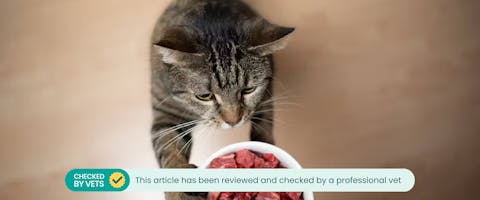Updated 12/05/2023
While a few years ago feeding your pet raw meat seemed like an oddity, raw diets are becoming more and more popular for our feline (and canine) friends these days. But can cats eat raw meat, and is it safe for them? Well it turns out that it’s a little more complicated than a simple yes or no, so let’s explore whether the popular raw diet really is safe for your cat…
Trending posts
Purr-use some of the top blogs our members have been loving this month- Top male dog names for your new furry friendGot a new furry family member in your pack? Check…

- Top female dog names for your new fluffy palWelcoming a new pooch into your family? Explore…

- 250+ gray cat names your silver feline will loveRecently welcomed a fluffy gray bundle of joy into…

- What are normal pet sitting rates?Discover the average pet sitting rates for animals…

- Unique dog names to stand out from the packDare to be different with our list of the best…

Can cats have raw meat?
While the popularity of raw diets for pets is on the rise, is it really safe for our fluffy friends? And more specifically, can a cat eat raw meat? Technically yes, cats can eat raw meat - it provides a wide range of essential nutrients as well as variety to their diet. The main drawback of raw meat for pets though, is that it’s a whole lot more risky than cooked meat. Why? Well it’s far more likely to contain bacteria and parasites. These can be passed onto humans and cats can shed harmful bacteria around the house. Pregnant women and immunocompromised individuals need to be especially careful. Plus, homemade raw meals may not cover all the key nutrients your cat needs.
The solution? Firstly, consult your vet to check if they’d recommend a raw diet for your cat specifically. Second, choose commercially available raw cat food that’s passed the safety standards. That way, you can worry less about its safety and nutritional value.
Is raw meat safe for cats?
Feeding your kitty raw meat comes with its risks, which, as a pet parent, you’ll need to be fully aware of before you make a decision. And if you’re still not sure, talk to your vet (which is always recommended for drastic dietary changes anyway).
- Parasites and bacteria. These are often removed by cooking the meat, but a raw diet might leave your kitty open to ingesting live parasites and bacteria. These can then be passed onto humans and spread around the house. To avoid these nasties, opt for a commercial raw diet rather than a homemade one - it’ll have passed various food safety requirements.
- Nutrition. Even with the best intentions, there’s no guarantee that homemade raw meals will be completely balanced with all the nutrients our feline friends need. So again, it’s much easier to make sure your kitty is staying healthy by opting for a commercially available raw cat food that meets safety standards.
- Bone pieces. Both raw and cooked bones are dangerous for ingestion - they can become stuck in the digestive tract, and cooked bones can splinter. While there’s no complete guarantee that zero bones will be present in bought cat food, at least it’ll have passed safety regulations in the packaging process.
- Contamination of your home. It's very important that you take the necessary precautions when preparing or handling raw food. Thoroughly disinfect all surfaces that come into contact with the raw food, and wear gloves or wash your hands after handling. All food should be stored in an appropriate place, where cross-contamination with other food cannot occur.
What raw meat can cats eat?
- Bacon? It’s not healthy for your cat due to its high salt and fat levels, but it can be eaten raw when in pre-packed cat food.
- Fish? Steer clear of feeding your cat raw fish from home, but some commercial raw foods may contain it, which of course, will have passed food safety measures.
- Beef? Yes, in moderation and from raw cat food product.
- Chicken? Yes, but follow the same precautions as you would with beef.
The bottom line? Remember that there’s no significant, added benefit to feeding your kitty a raw diet, only higher risks. So if you’re thinking about making the raw switch or incorporating it into your cat’s diet, do your research, consult your vet and steer clear from homemade raw meals, opting for commercially available raw food instead.
Meet our veterinary expert, Emma
This article has been checked by veterinarian Emma Chandley, BVetMed MRCVS PGCertSAS. Emma graduated from the Royal Vet College in London in 2011. She has a keen interest in surgery and went on to do a postgraduate certificate in small animal surgery and was then awarded advanced practitioner status in the same discipline.
What other human foods are safe for cats?
Find out about what's safe for cats to eat below...
- Cooked fish
- Cooked meat
- Oatmeal
- Corn
- Brown rice
- Cooked eggs
- Broccoli
- Carrots
- Apples and pears (if deseeded)

